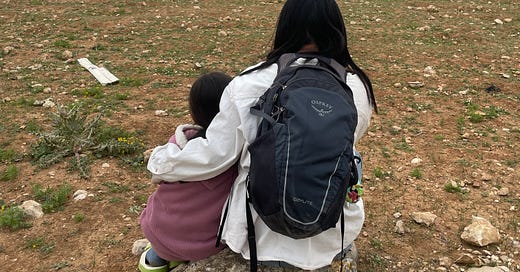In Levantine Arabic, there is a saying: yom assal w yom bassal. Some days are honey and some days are onion. Along with a few keys words and phrases, I memorized this saying before I arrived in Palestine. I had tried it out on some people and the response of being impressed and amused encouraged me to take it back to the Levant.
This morning, when the shepherd I was grazing with greeted me by asking me how I was doing, I responded with the only appropriate answer: Alhamduallah. He did the same when I posed this question. We then began to talk about all the things about the day and the area that were not so blessed. We spoke about the settlers spotted that morning. The settler leaders who had received ATVs from the Israeli government. And we discussed the hope for a quiet day before saying in union, inshallah.
After two months on the ground here, my group is tired and worn down. We lay on mattresses and discuss how quickly we would move our families to the nearby city of Yatta if we lived here. We marvel in amazement at the sumud of the people who continue to remain in Masafer Yatta. For them, the constant threat of violence, arrest, and demolitions are better than a life away from their family, friends, community, and livelihood. One cannot shepherd from a high rise apartment.
Today as I greet the shepherd, my Alhamduallah is one of an understanding of the assigned fate of this place. After we say inshallah, I say to the man in Arabic: some days are honey and some days are onion, but on all days we say praise G-d. The shepherd nodded approvingly as this appropriated wisdom coming out of an ajaneb’s mouth.
One day, as I was sitting on the couch in my neighbour’s house (a single mother household with three daughters), I again pulled out my honey and onion proverb. In response, the mom told me that all days for her are onion. All days in Masafer Yatta are always onion.
Using my broken Arabic, I responded that she was a liar. That she was sitting here surrounded by her wonderful family and laughing riotously. How could today be an onion day?! Of course I succeeded in getting a few more laughs out of her. Shortly after this exchange, she went back to zoning out on the couch. Her smile faded and was replaced with a tired and melancholic expression.
I revisit this memory often. I feel haunted by it. Her words and facial expression speak to the overall sentiments in this place. We laugh, we smile, we play, but always in the shadow of occupation. Always knowing that at any moment, our quiet moment can be interrupted by machine guns pointed at us.
One night, she tells us that she wishes to move to Yatta. That she cannot take living here. She feels immense worry and stress for her children. She never knows if they will be safe. She wants them to be able to attend school and play without fear of attacks or arrest. She tells us she will move when her 17 and 15 year old daughter graduate high school. She says they hate Yatta and do not want to move.
I sit and contemplate the family’s preferences. Here in the village, everyone is somehow related. When a baby is born, the entire village lines up to hold them and offer advice to the parents. Here in the village, no one calls to arrange hangouts, they simply come by and visit. Children come over to play with their cousins as their aunts and uncles ask after their parents and offer sweets.
Here in the village, we go and pick produce when we’re hungry and eat it as we watch the sheep. In Yatta, there are no fig or almond trees around the corner from apartment buildings. In Yatta, one cannot simply walk five minutes to their cousin’s house. But in Yatta (which is an area A city) there are no soldiers beyond of the checkpoints, which regulate who can come and go. In Yatta, there are no settler attacks. Settlers are scared to go into a large city populated by Palestinians.
Many families have moved to Yatta from Masafer Yatta. I meet them as they come back to visit. Some hold professions like social workers or drivers. But others seem to struggle to find employment in the city. My neighbor’s two oldest sons, who have married and moved to Yatta, come to visit frequently. They pick cauliflower and eggs and go to sell them in Yatta. They tell me the price of cauliflower is low right now. They tell me they must drive the backroads to come here and back to Yatta without checkpoints.
In Masafer Yatta, we always say: Alhamduallah. No matter what the day brings, people give thanks that they are alive even after they have been beaten and their home demolished. Here, people keep on keeping on, despite whatever terrible things befall them. Here, all days are onion. But still we praise G-d.




Beautifully written. As always.
Thank you Anna.